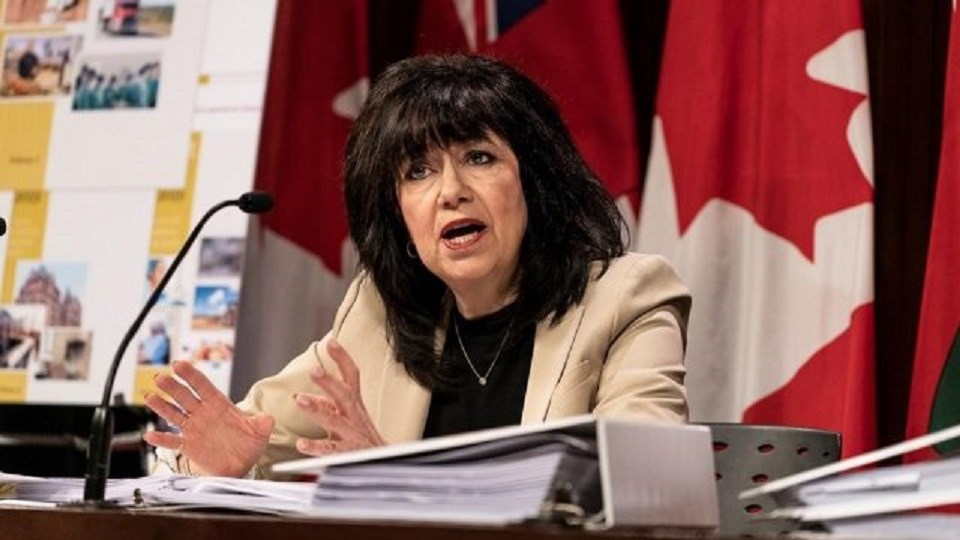Can Ontario's auditor general compel developers to testify as part of her investigation into the government's decision to open parts of the Greenbelt to build houses?
Auditor General Bonnie Lysyk certainly thinks so, evidenced by her summons of two prominent Ontario developers who had their properties removed from the Greenbelt in late 2022.
On Thursday, Premier Doug Ford waded into the debate and sided with the developers.
"I don't interfere in the private sector, but the auditor general, it's not even within her scope. She's asked to look for value for money. So I'm going to leave that up to them," Ford said during an announcement in Hamilton where the province spent nearly $4 million to train shipbuilders.
"I know our office is co-operating with the integrity commissioner, with the auditor general. You know why, folks? We have nothing to hide. We need to build homes, simple as that," the premier added.
The integrity commissioner's investigation is completely legit, Ford said, but Lysyk's "isn't even in her realm."
With his comments on Thursday, the premier was agreeing with claims made in the Ontario Superior Court by developers Michael Rice and Silvio De Gasperis. The men made separate claims recently to quash Lysyk's summonses.
The audit, which Lysyk described as probing the "recent changes to the Greenbelt and their economic implications, including their effect on Ontario's housing goals," falls outside of her traditional mandate, Rice's lawyers argued in his filing.
"The auditor general's role is not to investigate, audit, and/or examine private citizens under oath, or go on fishing expeditions with respect to their private corporate affairs," the filing said.
Because the audit is illegitimate, according to the filing, neither the Auditor General Act nor the Public Inquiries Act gives Lysyk the authority to force testimony.
"The proposed examination falls outside the scope of (the Auditor General Act) because it does not seek information pertinent to an audit or examination under the act," De Gasperis' lawyer wrote. Therefore, "the summons is an abuse of process."
The auditor general certainly has the power to compel testimony, thanks to the Auditor General Act, said Trevor Farrow, a professor at Osgoode Hall Law School.
The law "gives her jurisdiction to compel appropriate people to provide appropriate information in the context of an audit that's appropriately within her jurisdiction," he said.
Farrow isn't sure whether the ongoing probe falls within the powers conferred on the office by the legislation. That can only be settled in court, he said.
One potential argument Lysyk's office could advance to support her summonses is the government is delegating the execution of public policy to private firms, he said.
"This is directly public policy because the only way the government is exercising its policy on developing the Greenbelt is by directly engaging a private company. And so, by extension, that's part of the policy," Farrow posited.
On the other hand, the developers could say "this is a private development and the public's really not part of it," he said.
The government's original proposal mentioned its expectation that the landowners "develop detailed plans to build housing and move forward with the project quickly."
None of it sat well with NDP Leader Marit Stiles.
"When I hear the premier and others say they don't think the auditor general has purview here, I think they don't understand the role of the auditor general. If value for money isn't under the purview of the auditor general, I don't know what is," she said.
"That's why we asked the auditor general to undertake this. She is undertaking it. If they have nothing to hide, they should simply just be completely open with the auditor general and let's move forward," Stiles added.
In January, the leaders of the three opposition parties at Queen's Park asked Lysyk to "conduct a value for money audit and an assessment of the financial and environment impacts" of the government's Greenbelt policy and repeal of the Duffins Rogue Agricultural Preserve Act.
That request came after reporting from the Toronto Star, the Narwhal, the Globe and Mail, and CBC revealed a number of prominent developers with close ties to the Ford government stood to gain from the Greenbelt land swap.
It's not the first time Ford's criticized Lysyk for mission creep.
Last December, Lysyk released a series of audits on how well casinos protect against money laundering. She hired mystery shoppers to try to launder money at four casinos. At two casinos, the undercover gamblers were successful, while they failed at two others.
"The auditor general has to stay in her line and focus on where there's a waste of money,” Ford said at the time.
“You can’t do a sting operation. You can’t all of a sudden deputize yourself and think you’re the secret service — going around and doing sting operations that failed, by the way.”




